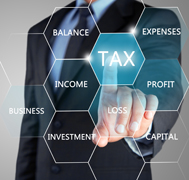Trying to Negotiate with the CRA is a Dangerous Game
 We are officially reaching the end of the 2017 tax season, and that means that most Canadians have completed filing and many are patiently waiting for their refund cheque in the mail. If, however, you’ve yet to file because you know a tax debt is headed your way, or have filed and have your assessment in hand, you’re probably at the other end of the spectrum. Your first thought may be to call the Canada Revenue Agency directly and attempt to negotiate a payment plan, but we urge you to read on and reconsider that approach. Trying to negotiate with the CRA is a dangerous game – one that can land you in a heap of financial trouble.
We are officially reaching the end of the 2017 tax season, and that means that most Canadians have completed filing and many are patiently waiting for their refund cheque in the mail. If, however, you’ve yet to file because you know a tax debt is headed your way, or have filed and have your assessment in hand, you’re probably at the other end of the spectrum. Your first thought may be to call the Canada Revenue Agency directly and attempt to negotiate a payment plan, but we urge you to read on and reconsider that approach. Trying to negotiate with the CRA is a dangerous game – one that can land you in a heap of financial trouble.
The CRA is well-known for their oft-nefarious tactics for collecting what they believe is owed. When you have a tax debt, the CRA is not interested in a long term payment plan with low monthly payments, and this is primarily why it is so dangerous to call.
When you initially call the CRA to negotiate a payment plan, things may not seem so bad. Agents are encouraged to cultivate a ‘friendship’ with you in the hopes that you will willingly share as much financial information as possible. This is usually accomplished with a financial disclosure form. In this form you’ll be asked questions about your income, where you work, where you bank, where you live and your current financial obligations. Don’t be fooled – the CRA is not asking for this information to help create a payment plan that suits your current financial situation.
Once you’ve provided this information, the CRA may agree to accept a temporary payment plan, but once this payment plan expires, that ‘friendship’ will also expire. Now that the CRA has all of your financial information, the new payment plan will take into account none but the most basic living necessities (all other creditors will be subtracted from the equation) and you’ll be facing a monthly payment far and above what you can reasonably afford to pay.
What if you don’t pay? Thanks to that financial disclosure form, not paying isn’t really an option. Not only does the CRA now know all about your finances they also know where you work, bank and live, making wage garnishments, frozen bank accounts and property liens that much easier to obtain.
So, if you shouldn’t be calling to negotiate directly with the CRA, what options are available? Unless you can pay the debt in full, speak with a financial consultant to discuss the various options available to clear the debt before enforcement action is levied against you. Once this happens, things are going to become much harder to navigate.
At DebtCare, we know how difficult the CRA can be to deal with. We also know how to protect you when it comes to dealing with a tax debt.
Get in touch today by calling 1-888-890-0888.


